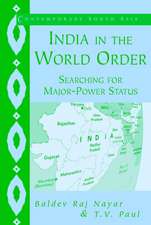The Dynamics of Coercion: American Foreign Policy and the Limits of Military Might: Rand Studies in Policy Analysis
Autor Daniel Byman, Matthew Waxmanen Limba Engleză Paperback – 3 feb 2002
| Toate formatele și edițiile | Preț | Express |
|---|---|---|
| Paperback (1) | 336.87 lei 43-57 zile | |
| Cambridge University Press – 3 feb 2002 | 336.87 lei 43-57 zile | |
| Hardback (1) | 749.49 lei 43-57 zile | |
| Cambridge University Press – 10 feb 2002 | 749.49 lei 43-57 zile |
Preț: 336.87 lei
Nou
Puncte Express: 505
Preț estimativ în valută:
64.46€ • 67.47$ • 53.65£
64.46€ • 67.47$ • 53.65£
Carte tipărită la comandă
Livrare economică 31 martie-14 aprilie
Preluare comenzi: 021 569.72.76
Specificații
ISBN-13: 9780521007801
ISBN-10: 0521007801
Pagini: 300
Ilustrații: 3 b/w illus. 2 tables
Dimensiuni: 155 x 229 x 16 mm
Greutate: 0.43 kg
Editura: Cambridge University Press
Colecția Cambridge University Press
Seria Rand Studies in Policy Analysis
Locul publicării:New York, United States
ISBN-10: 0521007801
Pagini: 300
Ilustrații: 3 b/w illus. 2 tables
Dimensiuni: 155 x 229 x 16 mm
Greutate: 0.43 kg
Editura: Cambridge University Press
Colecția Cambridge University Press
Seria Rand Studies in Policy Analysis
Locul publicării:New York, United States
Cuprins
1. Introduction; Part I. Coercive Strategy Making: 2. The theory of coercion; 3. Coercive Mechanisms; 4. Coercive instruments; Part II. The Context of Coercion Today: 5. Domestic politics and coercion; 6. Coercion and coalitions; 7. Humanitarian coercion and non-state actors; 8. Weapons of mass destruction and US coercion; Part III. The Future of US Coercion.
Recenzii
'Anyone wanting to know why the exercise of US power often doesn't work must read Byman and Waxman's excellent The Dynamics of Coercion; its analysis of US domestic politics and foreign coercion (in coalitions in particular) is clear, coherent and full of good sense.' The Guardian
'… this carefully researched and well-argued work will be of great interest to those concerned with the realities and specific challenges of post-Cold War UK foreign policy implementation.' Journal of Peace Research
'… this carefully researched and well-argued work will be of great interest to those concerned with the realities and specific challenges of post-Cold War UK foreign policy implementation.' Journal of Peace Research
Descriere
This book examines why some attempts to strong-arm an adversary work while others do not.





























